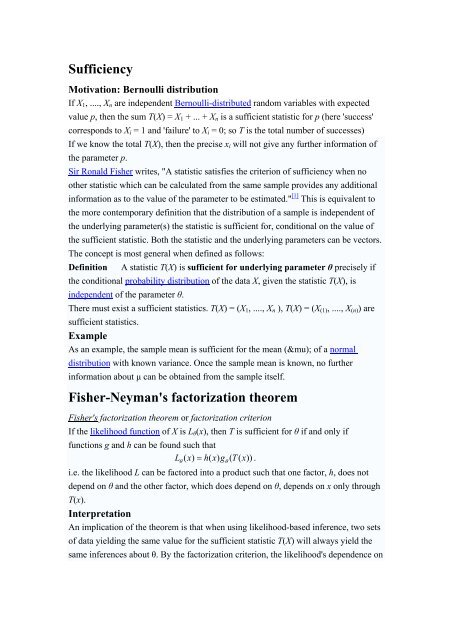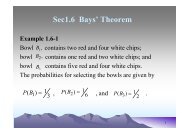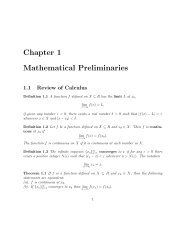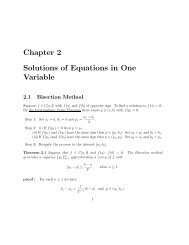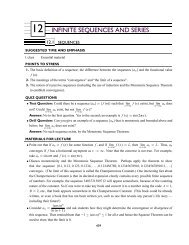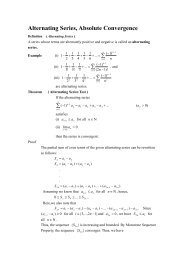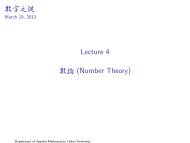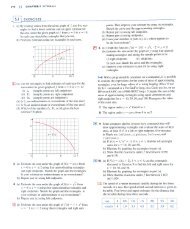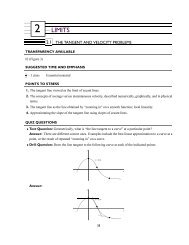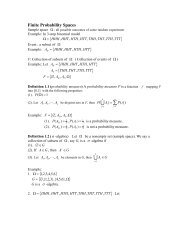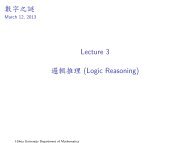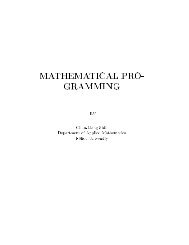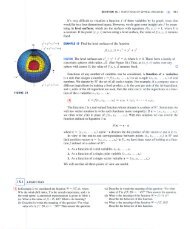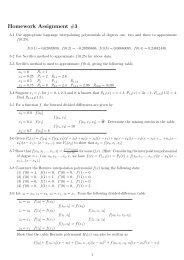Sufficiency Fisher-Neyman's factorization theorem
Sufficiency Fisher-Neyman's factorization theorem
Sufficiency Fisher-Neyman's factorization theorem
You also want an ePaper? Increase the reach of your titles
YUMPU automatically turns print PDFs into web optimized ePapers that Google loves.
<strong>Sufficiency</strong><br />
Motivation: Bernoulli distribution<br />
If X 1 , ...., X n are independent Bernoulli-distributed random variables with expected<br />
value p, then the sum T(X) = X 1 + ... + X n is a sufficient statistic for p (here 'success'<br />
corresponds to X i = 1 and 'failure' to X i = 0; so T is the total number of successes)<br />
If we know the total T(X), then the precise x i will not give any further information of<br />
the parameter p.<br />
Sir Ronald <strong>Fisher</strong> writes, "A statistic satisfies the criterion of sufficiency when no<br />
other statistic which can be calculated from the same sample provides any additional<br />
information as to the value of the parameter to be estimated." [1] This is equivalent to<br />
the more contemporary definition that the distribution of a sample is independent of<br />
the underlying parameter(s) the statistic is sufficient for, conditional on the value of<br />
the sufficient statistic. Both the statistic and the underlying parameters can be vectors.<br />
The concept is most general when defined as follows:<br />
Definition<br />
A statistic T(X) is sufficient for underlying parameter θ precisely if<br />
the conditional probability distribution of the data X, given the statistic T(X), is<br />
independent of the parameter θ.<br />
There must exist a sufficient statistics. T(X) = (X 1 , ...., X n ), T(X) = (X (1) , ...., X (n) ) are<br />
sufficient statistics.<br />
Example<br />
As an example, the sample mean is sufficient for the mean (&mu); of a normal<br />
distribution with known variance. Once the sample mean is known, no further<br />
information about µ can be obtained from the sample itself.<br />
<strong>Fisher</strong>-<strong>Neyman's</strong> <strong>factorization</strong> <strong>theorem</strong><br />
<strong>Fisher</strong>'s <strong>factorization</strong> <strong>theorem</strong> or <strong>factorization</strong> criterion<br />
If the likelihood function of X is L θ (x), then T is sufficient for θ if and only if<br />
functions g and h can be found such that<br />
Lθ ( x)<br />
= h(<br />
x)<br />
gθ<br />
( T ( x))<br />
.<br />
i.e. the likelihood L can be factored into a product such that one factor, h, does not<br />
depend on θ and the other factor, which does depend on θ, depends on x only through<br />
T(x).<br />
Interpretation<br />
An implication of the <strong>theorem</strong> is that when using likelihood-based inference, two sets<br />
of data yielding the same value for the sufficient statistic T(X) will always yield the<br />
same inferences about θ. By the <strong>factorization</strong> criterion, the likelihood's dependence on
θ is only in conjunction with T(X). As this is the same in both cases, the dependence<br />
on θ will be the same as well, leading to identical inferences.<br />
Example<br />
Binomial distribution p371 Ex2.7<br />
Exponential distribution p371 Ex2.8<br />
Normal distribution p372 Ex2.10<br />
Uniform distribution<br />
If X 1 , ...., X n are independent and uniformly distributed on the interval [0,θ], then T(X)<br />
= max(X 1 , ...., X n ) is sufficient for θ.<br />
If X 1 , ...., X n are independent and uniformly distributed on the interval [a,b], then T(X)<br />
= (min(X 1 , ...., X n ), max(X 1 , ...., X n )) is sufficient for [a,b] p373 Ex2.11.<br />
Poisson distribution<br />
If X 1 , ...., X n are independent and have a Poisson distribution with parameter λ, then<br />
the sum T(X) = X 1 + ... + X n is a sufficient statistic for λ<br />
Theorem<br />
Let X 1 , ...., X n be a random sample with pdf f(x|θ). If<br />
k<br />
∑ i = 1<br />
f ( x | θ ) = h(<br />
x)<br />
c(<br />
θ )exp{ w ( θ ) t ( x)}<br />
I<br />
, where h( x)<br />
≥ 0, c(<br />
θ ) ≥ 0 then T ( X ) = ( t ( X ), L , t ( ))<br />
is a sufficient<br />
statistics for θ.<br />
Example p376 ex2.14<br />
i<br />
i<br />
A<br />
( x)<br />
∑<br />
n<br />
∑<br />
n<br />
i=<br />
1 1 i i=<br />
1 k<br />
X<br />
i<br />
T(X) = (X (1) , ...., X (n) ) is better than T(X) = (X 1 , ...., X n ).<br />
Minimal sufficiency<br />
A sufficient statistic is minimal sufficient if it can be represented as a function of any<br />
other sufficient statistic. In other words, S(X) is minimal sufficient if and only if<br />
1. S(X) is sufficient, and<br />
2. if T(X) is sufficient, then there exists a function f such that S(X) =<br />
f(T(X)).<br />
Intuitively, a minimal sufficient statistic most efficiently captures as much<br />
information as is possible about the parameter θ.<br />
A useful characterization of minimal sufficiency:<br />
Theorem<br />
Suppose that the density f θ exists. T(X) is minimal sufficient if and only if
For any sample point x,y f ( x | θ ) f ( y | θ ) is<br />
independent of θ if and only if T(x) = T(y)<br />
This follows as a direct consequence from the <strong>Fisher</strong>'s <strong>factorization</strong> <strong>theorem</strong> stated<br />
above.<br />
Ex p377 ex2.16 ex2.17<br />
A complete statistic is necessarily minimal sufficient.<br />
Rao-Blackwell <strong>theorem</strong><br />
<strong>Sufficiency</strong> finds a useful application in the Rao-Blackwell <strong>theorem</strong>. It states that if<br />
g(X) is any kind of estimator of θ, then typically the conditional expectation of g(X)<br />
given T(X) is a better estimator of θ, and is never worse. Sometimes one can very<br />
easily construct a very crude estimator g(X), and then evaluate that conditional<br />
expected value to get an estimator that is in various senses optimal.


